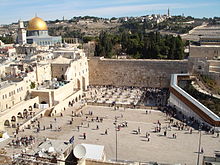
Back Portal:Judetum ALS بوابة:اليهودية Arabic Википедия:Портал:Йәһүдилек Bashkir Portal:Judndum BAR Portál:Hebraistika Czech Portal:Judentum German Portal:Cıhudiye DIQ Portalo:Judismo Esperanto Portal:Judaísmo Spanish Portail:Judaïsme French
The Judaism PortalJudaism (Hebrew: יַהֲדוּת, romanized: Yahăḏūṯ) is an Abrahamic monotheistic ethnic religion that comprises the collective spiritual, cultural, and legal traditions of the Jewish people. Judaism evolved from Yahwism, an ancient Semitic religion of the late Bronze Age to early Iron Age, likely around the 6th/5th century BCE. Along with Samaritanism, to which it is closely related, Judaism is one of the two oldest Abrahamic religions. Religious Jews regard Judaism as their means of observing the Mosaic covenant, which was established between God and the Israelites, their ancestors. Jewish religious doctrine encompasses a wide body of texts, practices, theological positions, and forms of organization. Among Judaism's core texts is the Torah, the first five books of the Hebrew Bible, a collection of ancient Hebrew scriptures. The Tanakh, known in English as the Hebrew Bible, is also referred to as the "Old Testament" in Christianity. In addition to the original written scripture, the supplemental Oral Torah is represented by later texts, such as the Midrash and the Talmud. The Hebrew-language word torah can mean "teaching", "law", or "instruction", although "Torah" can also be used as a general term that refers to any Jewish text that expands or elaborates on the original Five Books of Moses. Representing the core of the Jewish spiritual and religious tradition, the Torah is a term and a set of teachings that are explicitly self-positioned as encompassing at least seventy, and potentially infinite, facets and interpretations. Judaism's texts, traditions, and values strongly influenced later Abrahamic religions, including Christianity and Islam. Hebraism, like Hellenism, played a seminal role in the formation of Western civilization through its impact as a core background element of Early Christianity. (Full article...) Selected ArticleKashrut is the set of Jewish dietary laws. Food that may be consumed according to halakha (Jewish law) is termed kosher. Among the numerous laws that form part of kashrut are the prohibitions on the consumption of unclean animals (such as pork, shellfish and most insects, with the exception of certain species of locusts), mixtures of meat and milk, and the commandment to slaughter mammals and birds according to a process known as shechita. There are also laws regarding agricultural produce. Most of these laws are derived from the Books of Leviticus and Deuteronomy. Their details and practical application, however, are set down in the Oral Torah (eventually codified in the Mishnah and Talmud) and elaborated on in the later rabbinical literature. While the Torah does not state the rationale for most kashrut laws, many reasons have been suggested, including philosophical, practical and hygienic. Presently, about a sixth of American Jews fully keep kosher, and many more abstain from some non-kosher foods, especially pork. Kashrut is also kept by some non-Jews, often for health reasons. (Read more...) Did You Know?Did you know...
Related Categories
Featured Articles
Related PortalsHistory ArticleSimon Wiesenthal (1908–2005) was a Jewish-Austrian Holocaust survivor who became famous after World War II for his work as a Nazi hunter. He studied architecture and was living in Lviv at the outbreak of World War II. After being forced to work as a slave labourer in various Nazi concentration camps during the war, Wiesenthal dedicated most of his life to tracking down fugitive Nazi war criminals. In 1947 he co-founded the Jewish Historical Documentation Center in Linz, Austria, where he and others gathered information for war crime trials and helped refugees find lost relatives. He opened the Jewish Documentation Center in Vienna in 1961. He helped in locating Adolf Eichmann and preparing a dossier on Franz Stangl. In April 1970, when Bruno Kreisky became the Austrian chancellor, Wiesenthal told the press that four cabinet appointees had been members of the Nazi Party. Kreisky called Wiesenthal a "Jewish Nazi" and likened his organisation to the Mafia. He later accused him of collaborating with the Nazis. In 1986, Wiesenthal was involved in the case of Kurt Waldheim, whose Nazi past was revealed in the lead-up to the 1986 Austrian presidential elections, although Wiesenthal had previously cleared him of any wrongdoing. With a reputation as a storyteller, Wiesenthal wrote several memoirs that contain tales that are only loosely based on actual events. He died in Vienna on 20 September 2005, and was buried in Herzliya. The Simon Wiesenthal Center in Los Angeles is named in his honor. (Read more...) Picture of the Week Excavated stones from the wall of the Second Temple, knocked onto the street below by Roman battering rams in on the 9 Av, 70 CE Credit: Wilson44691 (talk)
In the News
Featured Quote
WikiProjectsThings You Can Do
Weekly Torah Portion
TopicsAssociated WikimediaThe following Wikimedia Foundation sister projects provide more on this subject:
Discover Wikipedia using portals | |||||||||
© MMXXIII Rich X Search. We shall prevail. All rights reserved. Rich X Search


























